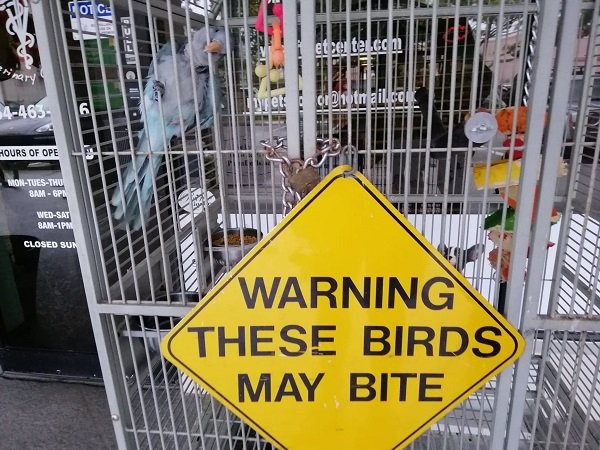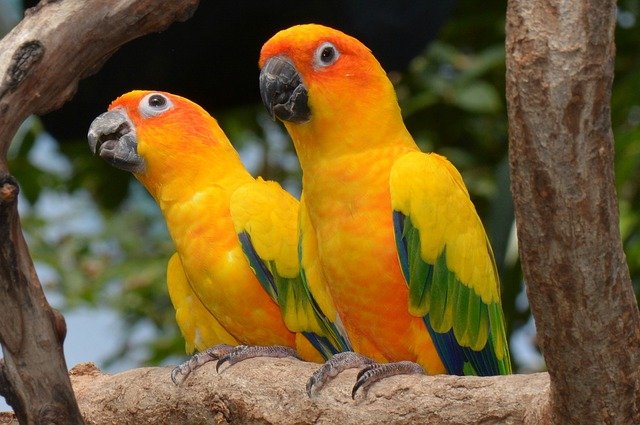Famed for his vibrant colors, sun conure is a medium-sized parrot from the popular conure species of parrot kingdom. Scientifically known as Aratinga Solsitialis, this fun-loving parakeet demands a lot of his owner’s care and attention, not just for 5-7 years, but a good whole two decades.
And if one can give him the highest quality of diet, care, and attention, he might be around for three decades. So, if one is thinking of adopting a sun parakeet aka sun conure, he must be ready for a long-term commitment of time and care for the bird.
The lifespan of Sun Conure

In the Wild
The surroundings in which the conure is being raised is capable of shortening or lengthening his lifespan. Found in coastal forest and dry savanna lands of northeastern South America, sun conures live a comparatively shorter life than those bred in captivity. So, telling exactly how long do sun conures live when in the wild? The sun conure parrot lifespan in the wild has been averaged at around 15 years with sometimes going up to 20 years.
There are varied reasons for them not enjoying a long life while in the wild. Falling prey to the wild animals or hunters, environmental pollution, unfavorable temperature, and living conditions, or non-availability of food and water are some of the most common reasons for a shorter lifespan taking care of all these, in addition to other things can make a positive impact on their longevity.
In Captivity
Sun conure lifespan as pets may or may not be longer than their counterparts living in the wild. It all depends on the bird owners how long they want their conure to live.
How long sun conures can live? Just like in the wild, sun conures can live on an average for 15 years with a maximum limit stretching to 20 years or so. But it is not unheard of suns living up to 30 years and beyond courtesy love and dedication of their owners. So is it possible to increase the lifespan of sun conures? If yes, then what are the dos and the don’ts?
Increasing Sun Conure Bird Lifespan
The conure family is quite large and every species has a different average age. Of the popular ones, the green cheek conure lifespan average is way more than that of his popular cousin’s sun conure. But that does not mean that this can not be stretched at all. Many owners have claimed their suns living by 35 years of age and that too, healthy and heartily.
How can sun conure lifespan be increased? All the owners that love their vivid-colored playful bird always look for the best answer to this question. Here are all the ways that if religiously followed, will exceed all the expectations of sun conure lifespan in captivity.
- Balanced Diet
Diet plays an important role in increasing the lifespan of any living being. Just as zero food intake can starve any being to death, the improper ones can reduce its longevity by at least a couple of years. Everyone has a preconceived notion that feeding grains to the birds are sufficient for their survival.
Undoubtedly birds can survive simply on grains but the quality of life will be at the lowest along with the average age. The reason being, these grains do not cover the complete nutritional profile which is required by the bird’s or sun conure’s body. Hence, a balanced diet consisting of a mix of everything in small quantities is a must.
Pellets of a high-quality must for 60-70% of the sun conure’s diet. Pellets have all the nutrients in the right mix which are essential for the bird’s growth. One can buy a pellet mix from a reputed brand from a nearby pet store or online.
Fresh fruits and vegetables are a must for sun conure’s great health. One can offer the way the bird prefers. Serve them diced, chopped, sliced, or pureed. Do not forget to remove the seeds from them and avoid all pitted fruits like avocado or apricots.
Seeds must form a small part of sun conure’s diet and many owners prefer them fortified to cover up the calcium and other scarce mineral needs. Though one can also offer them unfortified. But keeping their intake minimum is the key.
Freshwater is a necessity of every living being and sun conures are no exception. The hydrated body helps in regulating body temperature and flushing the toxins out, thereby, keeping diseases at bay.
2. Physical Health
If any living being is physically fit, his life will automatically be stretched. And being fit means an active body that has great immunity to diseases. Physical health can be kept at its best by various measures.
Exercise is the basic method to keep any being fit. And with conures being from the avian kingdom, their best exercise is flapping those wings. Letting the bird out of the cage for some time daily can help keep him at his best. And for those times when he is inside his cage, he must have access to multiple high-low perches to take short flights and stretch his wings whenever he feels the need to.
Hygiene is another important thing that plays an important role in maintaining any living beings’ good health. Maintaining sun conure’s hygiene can eliminate all the chances of bacteria breeding in and around the bird. Cleaning his food, water, and bathing dishes daily, changing the drinking water daily, removing leftover food after an hour, cleaning the cage for all the bird droppings, bathing the bird regularly, and grooming him at regular intervals are some of the basic acts of keeping the hygiene at its best.
3. Mental Health
Stress and depression can shorten any being’s life by damaging his brain cells and birds, especially those in captivity, are extremely prone to loneliness than any other living being. Hence, taking care of their mental health will help a great deal to increase their lifespan. And the best way to do this successfully is to keep their brains stimulated all the time.
Toys are the best source of giving mental stimulation to the ever-playful sun conures. And talking about their favorites, it’s the chewable, hands-down. Give them as many destructible toys for their constant chewing and they’ll not even realize how the day passed by. Organic wood-blocks, grass mats, old newspaper, or vine balls, all are their favorite items to get their dose of entertainment.
Devoting time to the sun conure daily would do great to keep him mentally fit. Many conure owners feel that they do not have spare time to devote to their birds and that is justified given the hard life in today’s cut-throat world. But if done smartly, achieving a balance between work and pet-time isn’t impossible. Simply keeping the bird’s cage around while relaxing in the evening, or letting the bird sit on the lap while watching television after a long day doesn’t need a time-cut from the daily schedule.
4. Regular Medical Checkups
Apart from providing a quality life to the sun, access to high-quality medical care ensures a healthy and long life. Hence, the regular annual visits to a certified avian vet. These checkups help in arresting any disease at its initial stage. Also, discussing the annual report of the bird’s behavior with the vet helps in knowing any unusual activity which the owner might have otherwise ignored thinking it as just another tantrum of his bird.
Sun Conure Color Mutation & Lifespan
As much as the original yellow-colored sun color is loved by the bird lovers, the second most famous sun conure, i.e., the red factor sun conure has also been getting a lot of attention lately. Everyone wants to know this beautiful conure family member wearing a red-wash all over his body. And about the red factor sun conure lifespan, it hardly differs from his original colored conure.
Living for an average of 15-20 years, these birds can easily live up to 30 years provided they care for just the way advised. A red factor sun would also need the same healthy diet, similar kind of mental stimulation and annual medical visits to the vet to beat all the life-threatening diseases.
Summing Up
Being one of the most loved pets of the conure family, the sun conures have got every bird owner interested. From knowing their personality to their likes and dislikes, they want to know it all. But the wiser ones want to know about the commitment they’ll have to promise to the bird. And it is justified considering the responsibility of a life one will take onto him.
Being thoughtful of what is good and what is not, for the bird is enough to make sun conure a long-time companion. And when in doubt, there is always an expert in the form of avian vet to extend help.



